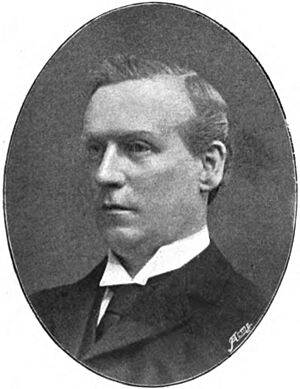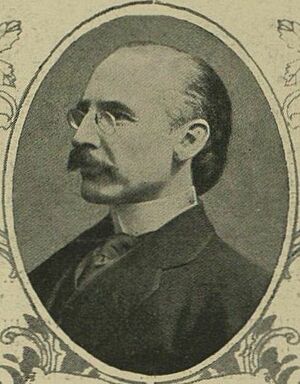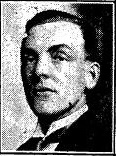East Fife (UK Parliament constituency) facts for kids
Quick facts for kids {{{Name}}}[[{{{Type}}} constituency]] |
|
|---|---|
| [[Image:{{{Map1}}}Constituency.svg|120px|]] [[Image:England{{{Map2}}}.svg|120px|]] |
|
| {{{Name}}} shown within [[{{{Entity}}}]], and {{{Entity}}} shown within England | |
| Created: | {{{Year}}} |
| MP: | {{{MP}}} |
| Party: | {{{Party}}} |
| Type: | House of Commons |
| County: | [[{{{County}}}]] |
| EP constituency: | [[{{{EP}}} (European Parliament constituency)|{{{EP}}}]] |
East Fife was a special area in Scotland that elected one person to the UK Parliament. This person is called a Member of Parliament, or MP for short. The East Fife area existed from 1885 to 1983. It was created when the older Fife area was split into two parts: East Fife and West Fife.
People in East Fife voted using a system called "first-past-the-post." This means the candidate with the most votes wins, even if they don't get more than half of all votes. A very famous MP for East Fife was H. H. Asquith. He was a member of the Liberal Party and later became the Prime Minister of the UK from 1908 to 1916.
Contents
What Was East Fife Like?
The boundaries of East Fife changed over time. When it was first created in 1885, it included many different parishes (small local areas) like Cupar, St Andrews, and Anstruther Easter.
Later, in 1918, some towns that used to have their own MP, like St Andrews and Cupar, became part of the East Fife area. This made the constituency bigger. It then included the Cupar and St. Andrews County Districts, plus the town of Leven and parts of the Scoonie and Kennoway parishes.
Who Represented East Fife?
Many different people were elected as MPs for East Fife over the years. They belonged to various political parties.
| Election | Member | Party | |
|---|---|---|---|
| 1885 | John Boyd Kinnear | Liberal | |
| 1886 | Liberal Unionist | ||
| 1886 | H. H. Asquith | Liberal | |
| 1918 | Alexander Sprot | Unionist | |
| 1922 | James Duncan Millar | Liberal | |
| 1924 | Archibald Cochrane | Unionist | |
| 1929 | James Duncan Millar | Liberal | |
| 1931 | National Liberal | ||
| 1933 by-election | James Henderson-Stewart | National Liberal | |
| 1961 by-election | John Gilmour | Unionist | |
| 1979 | Barry Henderson | Conservative | |
| 1983 | Constituency abolished | ||
Election Highlights
Elections were held regularly to choose the MP for East Fife. Here are some interesting moments from these elections:
Early Elections (1880s-1910s)
In the first election in 1885, John Boyd Kinnear won for the Liberal Party. However, in 1886, H. H. Asquith took over as the Liberal MP. He was very popular and won many elections for East Fife. He even became the Prime Minister while representing this area.
In 1918, after World War I, there was a big change. Asquith lost his seat to Alexander Sprot from the Unionist Party. This was a significant moment because Asquith was a former Prime Minister.
Mid-20th Century Elections (1920s-1950s)
The 1920s saw the seat change hands a few times. James Duncan Millar won it back for the Liberal Party in 1922. Then, Archibald Cochrane of the Unionist Party won in 1924. Millar won again in 1929.
In 1931, Millar was re-elected, but this time as a National Liberal. After he passed away, James Henderson-Stewart won a by-election in 1933 for the National Liberal Party. He continued to represent East Fife through the 1930s and 1940s.
Later Elections (1960s-1970s)
After Henderson-Stewart passed away, John Gilmour won a by-election in 1961 for the Unionist Party. He held the seat for many years.
In the 1970s, the elections became more competitive. The Scottish National Party (SNP) started to gain more votes. However, the Conservative Party (which the Unionist Party became part of) continued to hold the seat. Barry Henderson was the last MP for East Fife, winning in 1979 for the Conservative Party.
The East Fife constituency was abolished in 1983. Its areas were then split into new constituencies, like North East Fife and Central Fife.
Images for kids
See also
- North East Fife Constituency
| Parliament of the United Kingdom (1801–present) | ||
|---|---|---|
| Preceded by Worcestershire East |
Constituency represented by the chancellor of the Exchequer 1905–1908 |
Succeeded by Caernarvon Boroughs |
| Preceded by Stirling Burghs |
Constituency represented by the prime minister 1908–1916 |
Succeeded by Caernarvon Boroughs |
 | Toni Morrison |
 | Barack Obama |
 | Martin Luther King Jr. |
 | Ralph Bunche |






